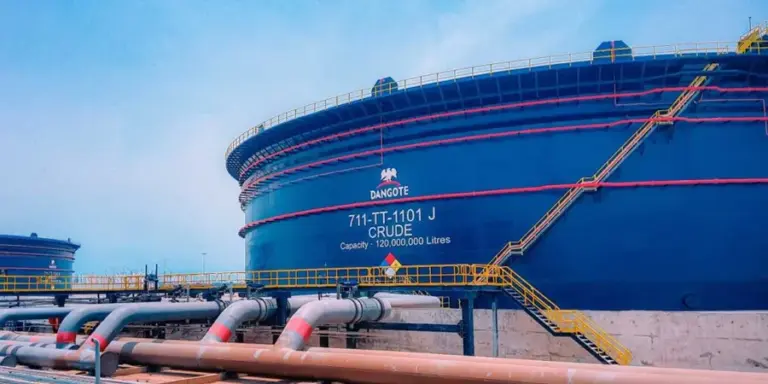Africa’s richest man, Aliko Dangote, is once again stretching the limits of industrial ambition. Barely months after his 650,000-barrel-per-day refinery began operations, the business magnate is now steering the project toward a bold new phase — one that could transform Nigeria into a global refining powerhouse.
According to S&P Global Commodity Insights, Dangote Industries Limited (DIL) plans to expand its refinery’s capacity to an astonishing 1.4 million barrels per day, potentially overtaking India’s Jamnagar Refinery as the world’s largest. It’s a scale of vision that has long defined Dangote’s empire — but this time, it comes with a global twist.
From Vision to Global Scale
In an exclusive conversation with S&P, Dangote revealed that his company is preparing to list up to 10% of its refinery business on the Nigerian Stock Exchange by next year, a move designed to open the doors to new investors and mark a shift from its traditionally private structure.
“Our business model is evolving,” Dangote said. “We want to bring in strategic partners — particularly from the Middle East — as we expand our footprint in refining and petrochemicals.”
The refinery, which sits on the shores of Lekki, Lagos, represents more than $20 billion in investment and years of engineering effort. Now, it’s poised for exponential growth. Engineers say the site was intentionally designed with expansion in mind, leaving space for a second refinery system that could double current output.
A Refinery That Powers Itself
Beyond oil, Dangote’s vision extends to energy self-sufficiency. The group is now Nigeria’s largest independent power producer, generating twice the electricity it consumes, effectively shielding operations from the blackouts that plague the nation.
The company’s expansion plans include new petrochemical units such as linear alkylbenzene and base oils, and an increase in polypropylene capacity from 1 million to 1.5 million metric tons. Together, these projects will deepen Nigeria’s industrial integration — turning crude oil into a chain of value-added exports.
Financing the Future
Earlier this year, analysts had raised concerns about Dangote’s maturing debt obligations, but in August, the company secured a $4 billion critical financing deal that cleared the path for its next development phase.
This funding will help launch both the refinery expansion and a new petrochemicals project in China, while the company courts Middle Eastern investors to solidify long-term partnerships. Dangote says the move marks the beginning of a new era for the conglomerate — one where global collaboration drives African progress.
“Africa cannot afford to depend on imported fuel forever,” Dangote warned. “If the private sector doesn’t take charge, we risk being left behind.”
Nigeria’s Energy Independence at Stake
S&P’s data predicts that Nigeria’s petrol imports could soar to 200,000 barrels per day by 2030, driven by population growth and rising demand. For Dangote, this is precisely the future he intends to prevent.
Rejecting smaller, state-backed refinery models as “a drop in the ocean,” he argues that Africa’s energy independence must come through bold, privately-led megaprojects — not incremental efforts.
“Governments lack the financial capacity and infrastructure for projects of this scale,” he noted. “That’s why we must lead.”
Overcoming Setbacks and Rebuilding Confidence
Despite its momentum, the refinery has faced operational challenges. Its Residue Fluid Catalytic Cracker (RFCC) unit briefly went offline in September, just weeks after a scheduled turnaround. However, Vice President of Refinery Operations, Devakumar Edwin, confirmed the system was fully restarted by October 7 and will soon run at full capacity.
Dangote said another short shutdown is planned for maintenance before year-end, ensuring the unit’s reliability ahead of Nigeria’s peak fuel demand season. The refinery’s main systems, he emphasized, only require a complete overhaul once every five years.
The company also recently weathered a labour dispute after 800 staff were dismissed in a reorganization drive. Dangote stated that new employment opportunities are being arranged for the affected workers, reaffirming that “there are no lingering issues with the unions.”
Securing the Crude Supply Chain
To stabilize crude sourcing, Dangote recently finalized a “crude-for-naira” swap deal with the Nigerian National Petroleum Company Limited (NNPC). Under the agreement, NNPC will provide 14 crude cargoes in exchange for refined products supplied in local currency — a move aimed at easing foreign exchange strain.
In addition, Dangote’s upstream assets in OML 71 and 72 are expected to begin producing up to 40,000 barrels per day before the end of October, further strengthening the refinery’s feedstock independence.
Beyond Nigeria: A Continental Strategy
Dangote’s empire continues to grow beyond Nigeria’s borders. Recent ventures include a fertilizer plant in Ethiopia, a storage terminal in Namibia, and a fleet of 4,000 CNG trucks to revolutionize African logistics. The group is also exploring new energy projects in Senegal as part of its strategy to build a pan-African industrial base.
The Global Stage Beckons
For Dangote, this expansion is not just business — it’s legacy. Listing part of the refinery, securing Middle Eastern partnerships, and doubling capacity to 1.4 million barrels per day mark a transition from national dominance to global influence.
“We want to show what Africa can achieve when private enterprise leads,” Dangote said. “This refinery is only the beginning.”

